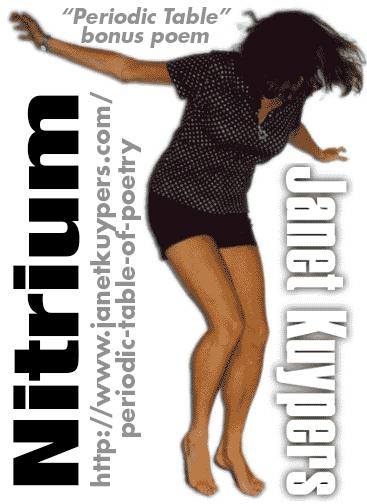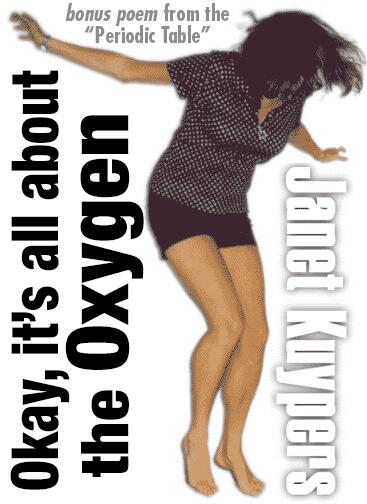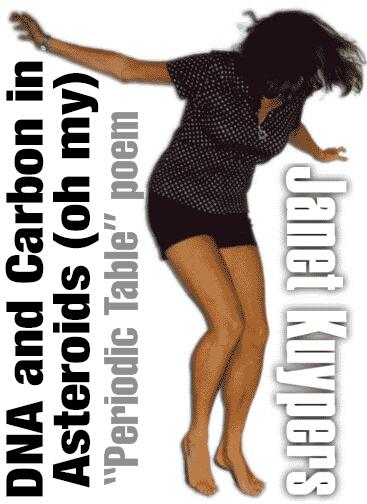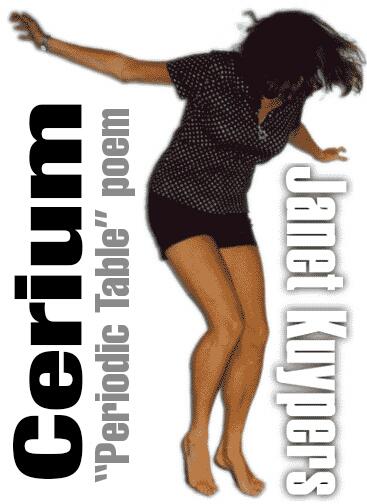Nitrium
Janet Kuypers

(bonus poem from the “Periodic Table of Poetry” series)
based on the original name (before Natrium) for Sodium, #11, Na
started 1/16/15, edited and completed 1/29/15
I’ve been studying elements
in the Periodic Table, and when
I heard the word “Nitrium,”
it made me laugh
(thinking of Nitrous Oxide).
So I looked it up online…
The only thing I could find
was from the Memory Alpha
in Star Trek Wikia,
and they could only guess
that Nitrium was either an alloy
or a metallic element.
But the history buff in me
remembered that Nitrium
is a variant of natrium,
and it was the original name
for the element Sodium.
(I mean, doctors even call
low sodium levels in the blood
hyponatremia…)
So as I read up
at my Star Trek Wikia —
I suddenly realized how
essential this Nitrium really was:
If you remember basic chemistry,
sodium reacts violently with water,
disintegrating, or even exploding
(no no no, you’re thinking of salt,
that’s not straight sodium,
that’s why it mixes with water…)
And as I read, Nitrium
(which was the first name
for Sodium)
was prevalent in asteroids
and it was used
in so many places
in the construction
of Federation starships.
Now, when it comes to our own bodies,
Sodium (or should I say Nitrium)
controls blood pressure
and blood volume —
it’s essential in our bodies
to keep them running smoothly.
So it makes total sense
that Galaxy-glass vessels
used Nitrium in their ships,
from computers, to engines
to their life support systems.
Nitrium was so crucial
to the Cost of Living —
you see, I expanded my research
from Star Trek Wikia
to straight-up Wikipedia
and discovered that parasites
were eating the Nitrium
all over the Enterprise,
jeopardizing the ship’s integrity.
Because as I’ve learned,
with every Periodic Table
element out there
there’s a good side
and a bad side:
if Nitrium is used
all over the Enterprise,
something could easily come along
to destroy it as well.
I mean, think of it
in our own bodies:
when Sodium (or Nitrium)
reacts with water
and forms Sodium Hydroxide,
but this reaction
gets the Hydrogen so hot
that it burns.
And if Nitrium
was the original name for Sodium,
that probably explains why
you never see
a Galaxy-class starship
entering a planet’s atmosphere,
where there’s water in the air.
Because really,
the people at Star Trek learned
that even just a little water in the air
would be enough
to make their starship
disintegrate
around them.
…Really, whenever the Enterprise
actually goed to a planet,
they never land on the planet
with their big Galaxy-class starship,
they send a shuttle,
or they beam someone down,
because in this case,
the water in the air
that’s embedded in the atmosphere,
that water could react
with the Sodium —
oops, I mean,
that water could react
with the Nitrium —
and it might actually
do the Enterprise in.
As I said,
with all the elements
I’ve studied,
there’s a good side
and a bad side to them.
We might desperately need them,
but they also may somehow
do us in
if they’re mixed
in the just the right way.
Because if you sit in a lab
in the twenty-first century,
you can watch this element
react with water in a beaker —
and if you’re going
where no one has gone before
in the twenty-fourth century,
you might have to be sure
your Nitrium-rich ship
finds no water in space,
and finds no parasites
that may eat you
out of your only way home.




